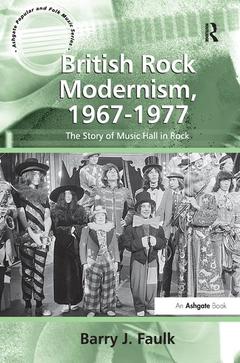British Rock Modernism, 1967-1977 The Story of Music Hall in Rock Ashgate Popular and Folk Music Series
Auteur : Faulk Barry J.

Date de parution : 11-2010
15.6x23.4 cm
Disponible chez l'éditeur (délai d'approvisionnement : 14 jours).
Prix indicatif 177,01 €
Ajouter au panierDate de parution : 02-2017
15.6x23.4 cm
Disponible chez l'éditeur (délai d'approvisionnement : 14 jours).
Prix indicatif 61,25 €
Ajouter au panierThème de British Rock Modernism, 1967-1977 :
Mots-clés :
British Rock Modernism; magical; British Rock; mystery; Young Man; tour; Magical Mystery Tour; music; Village Green Preservation Society; Sex Pistols; Pop Star; hall; MMT; British Rock Bands; Roll Circus; British Rock Groups; Traditional Englishness; Pepper’s Lonely Hearts Club; Street Fighting Man; Rock Auteur; Tv Film; Trad Jazz; Cilla Black; Modernist Art Project; Rolling Stones Rock; Women Singers; Gracie Fields; British Pop Music; Eleventh Hour; British Punk Movement



